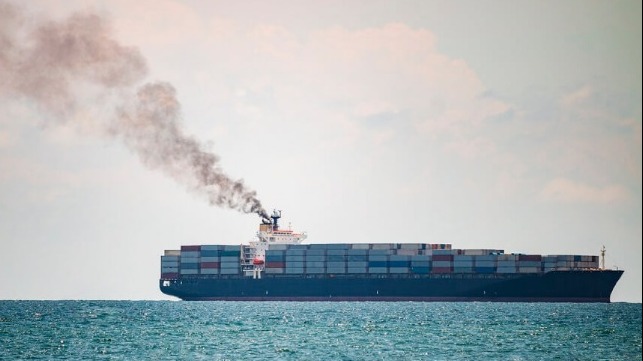Environmentalists Say FuelEU Maritime’s Transition is Too Slow

Environmentalists continue to be critical of the maritime industry as well as regulators in their efforts to get shipping to align with the broader climate goals of the Paris Agreement on global warming. The influential group Transport & Environment (T&E) released a new study looking at the potential impact of the FuelEU Maritime legislation finalized earlier this year and how it will address shipping and specifically container shipping’s use of fossil fuels. Reporting that it will be a slow transition, T&E is recommending that the European Commission make further improvements to the “Fit for 55” package for the shipping sector.
The group calls the FuelEU Maritime component “arguably the most important shipping-related legislation,” in the EU’s new package and said the program which reached a political agreement in the spring of 2023 is a welcome step in tackling shipping’s emissions. They said the regulation is “a positive step,” citing the introduction of mandates to transition to lower carbon fuels and the small, initial sub-target which they said will “kick-start the use of sustainable e-fuels.”
T&E’s new study aimed to analyze the impact of FuelEU Maritime combined with the European Union’s Emission Trading System (EU ETS) by modeling how shipping companies are most likely to act in the face of different regulatory constraints and pricing. The model, they reported, allowed them to predict potential demand from container operators in the EU for a range of marine fuels. The study projects what mix of technologies and fuels will be in demand from the containership segment across a period of 30 years from 2025, as well as the primary costs involved.
“Given the limited ambition of the GHG intensity reduction targets, FuelEU Maritime green-lights a slow-motion transition away from fossil fuels in shipping, with oil-based fuels and fossil gas still likely to make up the majority of fuel demand until 2045,” the group reports. “We find that under the existing regulation, the industry would see a slow transition away from polluting fossil fuels, such as LNG, which ships could continue using into the 2050s, towards more sustainable e-fuels.”
Under their base case pricing scenario, T&E’s study suggests that the current legislation will fall short of encouraging significant extra demand for non-biologic renewable fuels. They expect that demand for fossil LNG will continue to grow until at least 2035 when e-ammonia could begin to rapidly grow. They also looked at the impact of lowered biofuel prices or delays in the feasibility of ammonia engines.
Pricing they find could impact demand for other shipping fuels, including bio-methanol, e-methanol, e-diesel, and e-methane. They, however, speculate that in the “base case,” demand and efficiency assumptions, could lead to unsustainable volume demands for biofuel. They find it could reach an equivalent to 114 percent of current consumption by all EU transport. T&E believes that a sustainable transition is possible under an alternative scenario with lower demand growth and improved energy efficiency. However, they report that e-fuels’ share of shipping fuel demand would still need to reach 18 percent in 2035 and 85 percent in 2040 respectively to decarbonize the shipping sector.
“The shift to cleaner fuels is likely to be driven almost entirely by the progressive reduction in GHG intensity targets,” contends T&E. Based on that belief along with the conclusions that the current regulation permits “unacceptably heavy use of fossil LNG and also does too little to guarantee demand for renewable fuels,” T&E is recommending further “improvements” to the Fit for 55 package for shipping.

that matters most
Get the latest maritime news delivered to your inbox daily.
They continue to call for the greenhouse gas intensity targets to be aligned with the Paris Agreement. To achieve their targets, they want higher and additional targets for renewable fuel along with expanding the FuelEU package to cover more ships, including below 5,000 gross tons as well as offshore vessels and other non-cargo ships. They also want mandates for more sustainable fuels, such as ammonia, methanol, and hydrogen, to replace the existing LNG bunkering infrastructure.
T&E concludes its recommendations by calling for the implementation of mandatory energy efficiency requirements on European shipping. They also want strong penalties for non-compliance to discourage the shipping industry from simply paying for compliance instead of making significant changes to reduce emissions.
